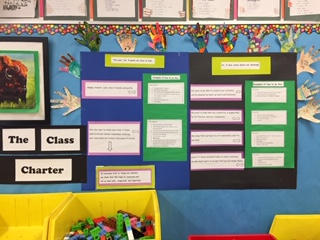With the beginning of November upon us, I thought I would give a quick update on the Curricular Competencies we have been practicing and focussing on in class. In the upcoming weeks, you will see samples of your child’s work in their blogfolios.
Language Arts and Social Studies:
-have often been integrated this term as we prepared for our Learning in Depth research
- inquiry/research processes: notetaking; using keywords, using graphic organizers to organize and categorize information

- we have also been brainstorming areas of interest and questions to guide inquiry directions as well as developing awareness of the variety of sources available for research
- features of non-fiction books and how to use them for research: tables of content; glossaries, indexes, headings
We were lucky to have Mrs. Field come to our class to help us with our understanding of non-fiction books.

Language Arts: Reading
- We finished a class novel, Dolphins at Daybreak. Together, we practiced: how to write a summary (selecting the important events, using notetaking format to list them in sequential order), making connections (text-to-text, text-to-world, text-to-self), and working on comprehension strategies (summarizing, connecting, questioning, and activating our prior knowledge)
- we are also working to answer comprehension questions using full sentences and practicing our ability to find the author’s message in a story
- we started our “in-class” Guided Reading groups with different novels for each grouping. We are practicing our fluency and decoding skills at our personal reading level
- because we were able to practice writing summaries and making connections with our teacher using our first class novel, we are now trying to develop our independence and show that we can write summaries (according to our criteria), make connections, and respond to comprehension questions more independently
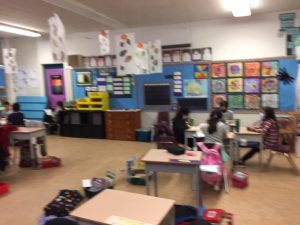
Language Arts: Writing
- in addition to all of the above, we are using the Words Their Way program to continue to develop our sound knowledge
- We do a 10-minute free write most days and share our writing with a small group on Friday. We have been looking at all the forms of writing that are possible; from making lists to writing a play, to writing a poem or a review. We are going to build toward a weekly editing session in the next term.
- Journals/personal writing: we have been looking at samples of writing that have helped us to understand the features of writing that you would see or not see in an emerging, developing, proficient, and extending piece of personal writing. We are working to reduce repetition, add more relevant detail, use connecting words, and proofread for missing punctuation and spelling. We have worked on idea generation, using brain pockets, so that our journal writing is not always about what we did on the weekend.
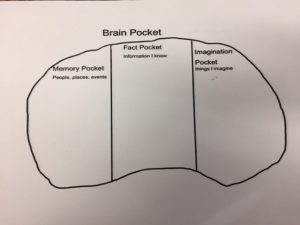
Science
From the beginning of the year, we have been doing a weekly science problem that gets us thinking critically, drawing on our background knowledge, inferring possible reasons for our findings, and connecting. Most often, we follow up those problems with Core Competency self-assessments focussing on the Thinking Competencies. In the example below, we connected our findings to humans and the need for snowshoes. We then connected snowshoes to Indigenous technology.
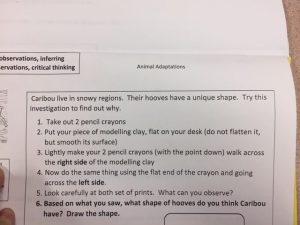
Through our Wilderness Wednesday periods we go outside to observe, experience, and interpret our local environment. We have observed spider webs and noticed the abundance of spiders as a feature of autumn. We have observed the regularity of webs and explored webs and patterning in Art. We have also focused on trees and itemized the benefits trees provide.
We will soon be starting a unit on ecosystems.
Math
- we have worked to build number sense and mental math strategies by learning about place value
- we have worked to represent our numbers pictorially, symbolically, and concretely
- we have worked with money concepts
- we have worked to build an understanding of estimation
- we are currently learning about patterns; repeating, core, increasing, and decreasing
Art
- has been integrated into all the other subject areas and includes an opportunity to work with a variety of materials and some student self-assessments
Applied Design, Skills and Technologies
- with the understanding that skills can be developed through play, centre-time is an important part of our week and students have access to a variety of building and design materials
- they have created designed environments from marble runs to Plus Plus to Lego to wooden blocks to magnetic triangles. Through trial and error, they have made changes, solved problems, and incorporated ideas from others
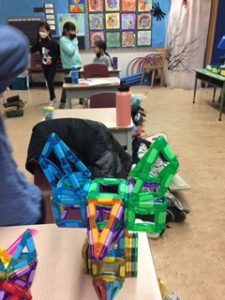
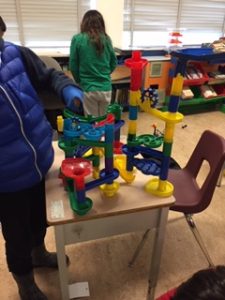
P.E.
- through games like Number Soccer, Hula Hut, and Circulation Volleyball, we have been learning fundamental movement skills that focus on running, kicking, catching, and safe movement in our gym
- Through our social/emotional program RULER, we have identified that physical activity is an important daily component of our lives; it helps us to feel more confident and to be mentally strong
I am proud of the involvement and participation of all Div. 5 students in the many areas of learning listed above. Our discussions are rich and our learning is shared and appreciated between classmates and friends.
